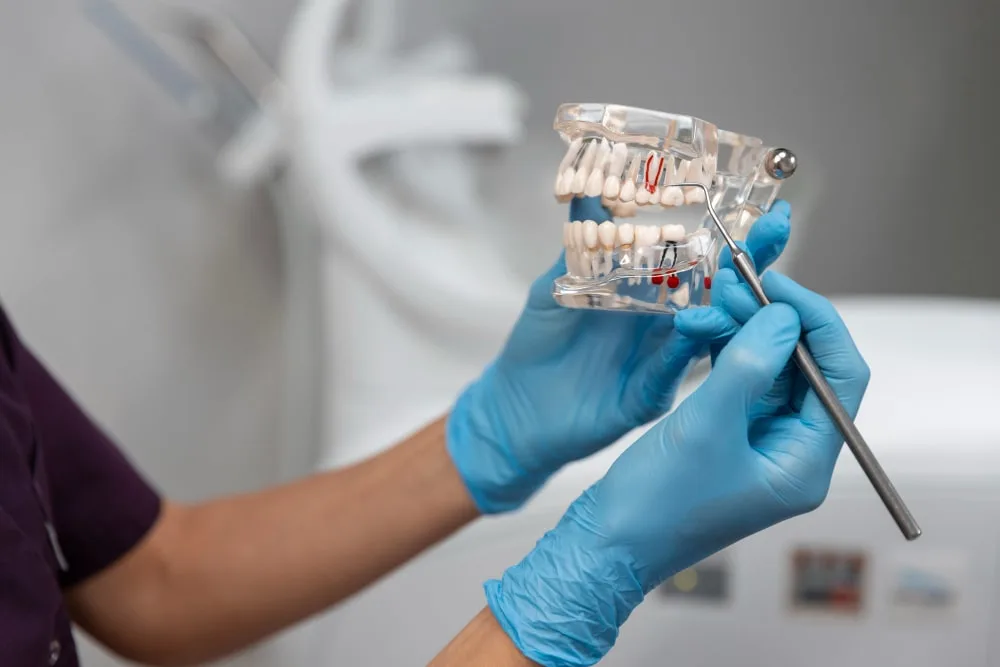When it comes to replacing missing teeth, dental implants are often considered the gold standard. They are durable, look natural, and restore full function to your smile. However, one big hurdle for many people is the cost of dental implants. The price can vary widely, and insurance typically doesn’t cover the full expense. But don’t worry—there are ways to get dental implants covered by insurance. In this guide, we’ll walk you through everything you need to know about how to navigate dental insurance and make dental implants more affordable.
1. Understand the Basics of Dental Implants
Before diving into the insurance details, let’s first understand what dental implants are and why they can be costly.
Dental implants are titanium posts surgically placed into the jawbone to replace missing teeth. A crown or other type of dental restoration is then placed on top of the implant. Unlike dentures or bridges, implants offer a permanent solution to tooth loss and prevent bone loss in the jaw. However, due to the complexity of the procedure, dental implants tend to be more expensive than traditional alternatives.
2. Know What Insurance Plans Typically Cover
Dental insurance can be a bit tricky when it comes to implants. Most standard dental plans do not cover implants unless they are considered “medically necessary.” Here’s a breakdown of how different types of insurance plans generally approach dental implants:
- Basic Dental Insurance: Most basic dental plans focus on preventive care (like cleanings and checkups) and treatments for cavities and gum disease. These plans usually don’t cover implants.
- Major Dental Insurance: Some major dental plans will cover a portion of the cost of implants, but this is often limited to certain conditions. For example, if you’re getting implants due to a medical issue or after an injury, they might be more likely to be covered.
- Medical Insurance: While dental insurance typically doesn’t cover implants, some medical insurance plans may if the implants are needed for medical reasons. For example, if you need implants because of a traumatic injury or a congenital condition, your medical insurance may help cover the costs. However, this often requires thorough documentation and medical justification.
- Dental Discount Plans: Though not technically insurance, dental discount plans can offer significant savings on dental procedures, including implants. These plans typically don’t cover the entire cost, but they can reduce the out-of-pocket expenses.
3. Check Your Current Coverage
If you already have dental insurance, the first step is to carefully review your plan. Look for any clauses related to dental implants, as some plans may provide partial coverage under certain circumstances.
Here are a few tips to help you review your insurance plan:
- Contact your insurance provider: Speak directly with your dental insurance provider to ask whether implants are covered and, if so, to what extent. They can give you a detailed breakdown of your coverage.
- Check your plan’s benefits booklet: Insurance companies often provide a booklet that explains what’s covered under your plan. Look for keywords like “dental implants,” “prosthodontics,” or “major dental procedures.”
- Ask about exclusions: Many insurance plans have exclusions, meaning they won’t cover implants if the teeth are lost due to certain reasons (like cosmetic purposes or aging). Understanding these exclusions is important to setting realistic expectations.
4. Explore Payment Plans and Financing Options
If your insurance doesn’t cover the full cost of implants, or if you don’t have insurance at all, consider exploring payment plans or financing options. Many dental practices offer financing through third-party companies that specialize in dental care, such as CareCredit or LendingClub.
These financing options allow you to break up the cost of dental implants into smaller, more manageable monthly payments. Some practices also offer in-house payment plans, so it’s worth asking about any flexible payment options they may offer.
5. Use Health Savings Accounts (HSAs) or Flexible Spending Accounts (FSAs)
If you have an HSA or an FSA, you can use the funds in these accounts to help pay for dental implants. Both HSAs and FSAs allow you to save money tax-free for medical and dental expenses, making them a great option to reduce your out-of-pocket costs.
- Health Savings Accounts (HSAs): If you have an HSA, you can use the funds for medical procedures that are not typically covered by insurance, including dental implants. Just make sure to check if your plan allows for dental expenses, as some might have specific rules.
- Flexible Spending Accounts (FSAs): Similar to HSAs, FSAs let you save money tax-free for healthcare costs. However, FSAs have a “use-it-or-lose-it” rule, so be sure to use the funds within the year they are allocated.
6. Appeal Denied Claims
If your insurance provider denies your claim for dental implants, don’t give up. You have the right to appeal the decision. Here’s how to handle a denial:
- Request an Explanation: If your claim is denied, ask for a detailed explanation of why it was rejected. This will give you an understanding of what specific factors led to the denial.
- Provide Additional Information: In some cases, insurance companies will deny a claim because they believe the procedure is not medically necessary. If you can provide additional medical evidence or documentation from your dentist, this may help strengthen your case.
- Submit an Appeal: Once you’ve gathered all relevant information, submit a formal appeal to your insurance provider. Make sure to include any additional documentation and clearly explain why the procedure should be covered.
Conclusion
Getting dental implants covered by insurance can feel like a complicated process, but it’s possible with the right knowledge and strategy. By understanding your insurance plan, exploring financing options, and utilizing HSAs or FSAs, you can make the process more manageable. And if your claim is denied, don’t hesitate to appeal—it could make a big difference in reducing your out-of-pocket costs.
At Orchid Periodontics, we’re dedicated to helping you find the best solutions for your dental care needs. If you have any questions about how to get dental implants covered by insurance or need assistance with financing, don’t hesitate to reach out to our team today. We’re here to help you get the smile you deserve!
We proudly serve patients in Edmonds, Bellevue, Shoreline, Lynnwood, Kirkland, and surrounding areas throughout the greater Seattle region, providing expert dental implant care tailored to your needs.
To schedule a consultation, call us at 425-775-2002. Patients can also contact us through our website contact form or email.




